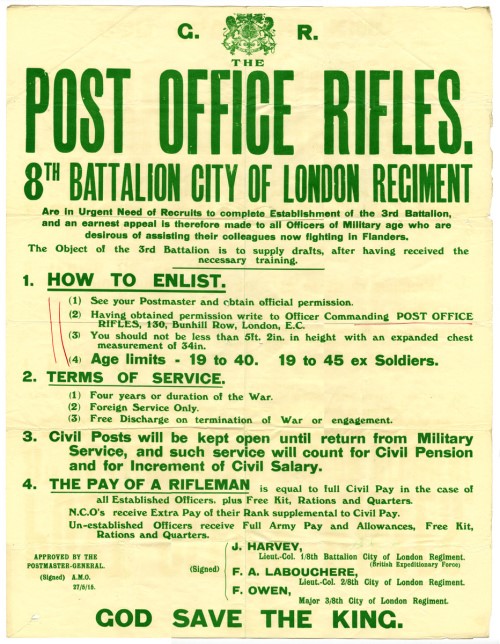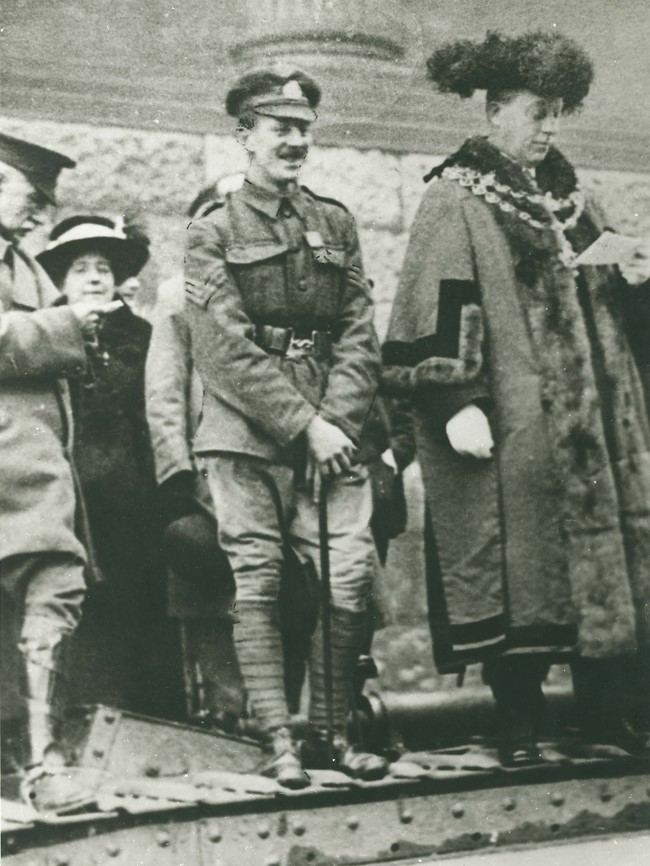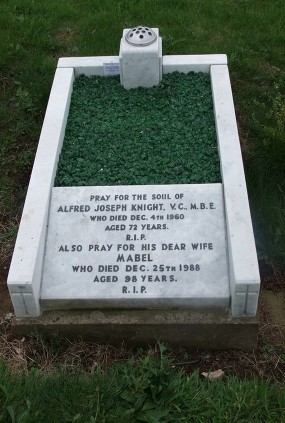
By Richard Boot
In November 1917 the London Gazette published the citation from the War Office for Alfred which reads:
‘’For most conspicuous bravery and devotion to duty during the operations against the enemy positions Sjt. Knight did extraordinary good work and showed exceptional bravery and initiative, when his platoon was attacking an enemy strong point and came under very heavy fire from an enemy machine gun.
He rushed through our own barrage, bayonetted the enemy gunner, and captured the enemy position single-handed. Later, twelve of the enemy with a machine gun were encountered in a shell hole. He again rushed forward by himself, bayonetted two and shot a third and caused the remainder to scatter.
Subsequently, during the attack on a fortified farm, when entangled up to his waist in mud, and seeing a number of the enemy firing on our troops, he immediately opened fire on them without waiting to extricate himself from the mud, killing six of the enemy. Again, noticing the company on his right flank being held up in their attack on another farm, Sjt. Knight collected some men and took up a position on the flank of this farm, from where he brought a heavy fire to bear on the farm as a result of which the farm was captured.
All the platoon officers of the company had become casualties before the first objective was reached, and this gallant N.C.O. took -command of all the men of his own platoon, and of the platoons without officers. His energy in consolidating and reorganising was untiring. His several single-handed actions showed exceptional bravery and saved a great number of casualties in the company. They were performed under heavy machine gun and rifle fire, and without regard to personal risk, and were the direct cause of the objectives being captured’’.
A clear picture emerges of a very brave and special person who was 29 at the time of this action.
It took place on 20th September 1917 at Wurst Farm Ridge in the Alberta sector, Ypres in Belgium. At the time Alfred was a Sergeant with the 2/8th (City of London) Battalion, The London Regiment (Post Office Rifles).
Originally formed to protect GPO premises it is interesting to note that around 12,000 employees from across the UK signed up to join the Post Office Rifles with a further 63,000 joining other Regiments. Sadly, of those in the Post Office Rifles over half were killed (1,800) or wounded (4,500).
To accommodate the swell of recruits in the First World War, a second Post Office Rifles Battalion was formed in September 1914. They were titled the 2nd/8th Battalion, City of London Regiment.
They fought at Ypres and Passchendaele, Belgium and suffered tremendous losses.
More than half of their fighting force was lost at the Battle of Wurst Farm Ridge in September 1917 the action in which Alfred was awarded his VC.

Alfred who was the only Post Office Rifleman to win the VC was born in Ladywood in Birmingham on 24th August 1888 and attended St Philip’s school in Edgbaston. He joined the Post Office and initially worked as a Clerical Assistant in the North Midland Engineering District based in Birmingham.
Alfred was working for the Post Office in Nottingham from 1912 when War broke out and he enlisted in the 2nd Battalion on 26th October 1914. His unit was not posted to France until 1917 by which time he had in 1915, married Mabel Saunderson in May of that year.
The first combat situation the unit experienced was during the Battle of Bullecourt. During this action Alfred returned wounded soldiers to the trenches under severe enemy fire and for this act of bravery he was given a battlefield promotion to the rank of Sergeant.
On 3rd January 1918, Sergeant Alfred Knight was awarded the Victoria Cross by King George V in a ceremony held at Buckingham Palace. When his award was announced, Knight quickly became a local celebrity in both Birmingham and Nottingham.
Knight served in the Post Office Rifles until the First World War ended and in 1919 was commissioned as a Second Lieutenant with the Sherwood Foresters.
When the Sherwood Foresters were then demobilized, Alfred Knight returned to his role within the Post Office.

It is said that Knight joked about press accounts of his VC action which he thought made him out to be “a man from whom the bullets bounced”. The press was much taken by his sense of humour; one Birmingham newspaper dubbed him “the Jolly VC”.
Knight recalled being fascinated “by the pattern made all the way round me in the mud by the German bullets”. He referred to his survival as a “miracle” and added “All my kit was shot away almost as soon as we were in it. Everything went, in fact. Bullets rattled on my steel helmet – there were several significant dents and one hole in it I found later – and part of a book was shot away in my pocket. A photograph-case and a cigarette-case probably saved my life from one bullet, which must have passed just under my arm-pit – quite close enough to be comfortable!”
After the war he was transferred to the Ministry of Labour and when he retired in 1951 he was Senior Wages Inspector in the Midlands section.
He was appointed a Member of the Order of the British Empire in 1951.
Alfred Knight died at home at the age of 72 in December 1960 and is buried in Oscott Catholic Cemetery Birmingham.

In 2005, Birmingham City Council named a street in his honour on the Park Central development in Ladywood, where Alfred Knight grew up.
